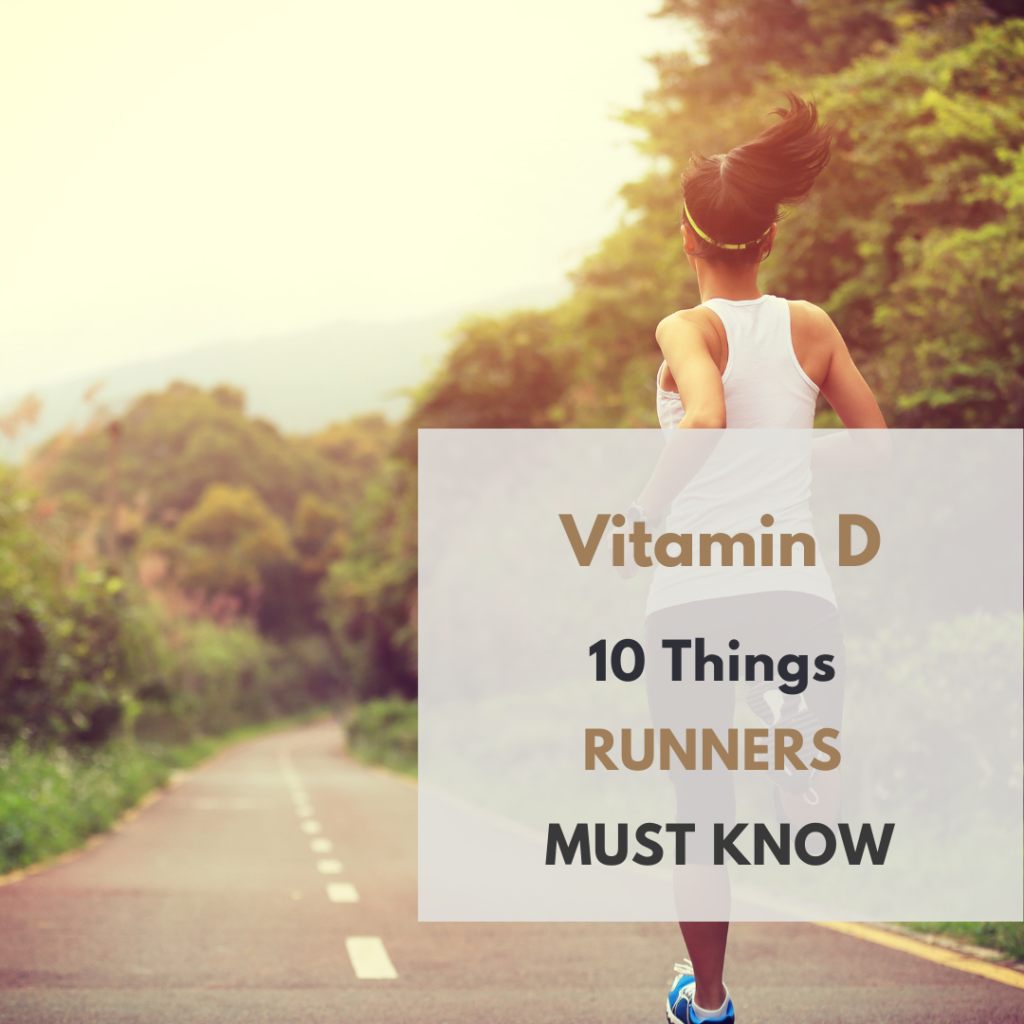10 Things Runners Must Know About Vitamin D For Optimal Health and Performance
What are the best vitamins for running?
The best vitamins for running can be a controversial topic, but most experts agree that vitamin D for runners and vitamin D for endurance athletes is a topic that needs to be addressed.
Should runners be taking vitamin D supplements?
Probably- read on to find out exactly why, what, and when to take them.
As we spend more time indoors, meaning less sunshine, one thing you need to think about as a runner is your level of vitamin D.
Appropriate levels of vitamin D are associated with better sports performance and reduced injury rates- exactly what we want as runners.
Let’s start with the basics about vitamins for runners, specifically vitamin D!

1.What exactly is vitamin D and why do we care about vitamin D for runners?
Think of vitamin D as the sunshine vitamin!
Vitamin D is a fat-soluble nutrient required to absorb calcium and phosphorus, and thus, to make and keep bones strong.
Fat-soluble vitamins are what they say they are- they are absorbed with fats in the diet and are stored in our fatty tissue and in the liver.
Our bodies do not produce vitamin D naturally.
Instead, we require sunlight to synthesize, or make vitamin D. When exposed to sunlight’s ultraviolet rays, our skin produces vitamin D. It undergoes hydroxylation before it gains full hormonal activity.
2. Why is there all the buzz about vitamin D supplements?
You are just wondering what vitamins to take for running- why consider vitamin D?
In recent years, the ‘buzz’ began because of the lower amounts of sunlight we were exposed to (especially if you live in the north like me and use sunscreen).
Vitamin D promotes calcium absorption, which we need for bone strength and growth.
Additionally, vitamin D plays a role in reducing inflammation throughout the body, maintaining our immunity, and controlling glucose levels. Women in perimenopause or menopause need to have vitamin D levels checked.
3. What is a ‘normal’ level of vitamin D?
Data suggest between 40-70% of Americans have low vitamin D levels.
One study in Dallas reported up to 75% of runners who ran an average of 20 miles / week were vitamin D deficient.
Normal levels were previously thought to be 20-40 ng/mL.
However, back in 2011,the Endocrine Society suggested a higher minimum (30 ng/mL) and even possibly 40-60 ng/mL due to variation in assays. Some sports medicine physicians suggest a level of 50 ng/mL to be optimal. Confused yet about normal vitamin D levels?
Let’s simplify…low vitamin D is definitely under 20 ng/mL and probably under 30 ng/mL. Too high is also an issue- levels about 60 ng/mL are not recommended. Just like mileage, more isn’t always better.
Ideal levels are most likely right around 40 ng/mL.
4. How do I get my vitamin D levels checked?
Your doctor can measure the 25-hydroxy vitamin D blood test with a simple blood draw. At-home tests are also available.
5. What are potential problems or issues related to low vitamin D for runners?
Vitamin D deficiency has been associated with various diseases, including cancer, diabetes, multiple sclerosis, autoimmune conditions, and cardiovascular disease.
People with low vitamin D levels may complain of poor sleep quality, feeling tired or achy, although some have no symptoms at all.
Now you are wondering, is more vitamin D good for runners?
Specific to runners, vitamin D deficiency may negatively affect training and performance. If you have low levels of vitamin D, your bones will be more susceptible to injuries, such as stress fractures. You may also feel weaker than normal and be more apt to get colds and other illnesses.
Supplements for runners is a tricky subject. Obviously, it’s always ideal to get our nutrition and vitamins through food. However, that is not always possible and vitamins for running are sometimes needed.
6. Should I take a vitamin D supplement as a runner?
For ages 1-70, the minimum amount of vitamin D/day is 600 IU.
For 71+ adults, the amount goes up to 800 IU.
If you are wondering how much vitamin D should a runner take, this depends on your baseline level BUT for most of us runners…yes, you will want to take a vitamin D supplement.
In general, most adults and runners should take a vitamin D supplement of 2,000 IU / day.
Now, what is the best vitamin D supplement for runners? You should take vitamin D in the form of vitamin D3 (cholecaliferol). This is the type of vitamin D our bodies make when we are exposed to sunlight.
7. Are there any concerns about taking a vitamin D supplement with other medicines or foods? What is the best time to take vitamin D supplements?
For best results, take your vitamin D supplement with a healthy fat, such as a slice of avocado, an egg, or a handful of nuts or seeds. The healthy fat helps the fat-soluble vitamin to be absorbed.
Even easier, just try to take your vitamin D with your largest meal of the day. This answers the question of when to take vitamin D- it’s honestly when you are most apt to remember it.
If you take other medicines, consult with your doctor or pharmacist before increasing your vitamin D.
8. Is one vitamin D supplement better than another? Which is the best vitamin D supplement for runners?
You should take vitamin D in the form of vitamin D3 (cholecaliferol). This is the type of vitamin D our bodies make when we are exposed to sunlight. However, some research shows vitamin D2 supplements are equivalent to D3.
Because supplements are not regulated, it’s usually best to go with a large name-brand or well-known brand. Pills, drops, whatever form you prefer is fine. A few we recommend-
Vitamin D Supplements- Amazon:
NOW Foods vitamin D-3 supplement
Vitamin D supplement gummies (what my kids take)
Best vegan vitamin D supplement:
Amazon Brand Revly Vegan Vitamin D
Vitamin D supplement for vegetarians:
9. What foods are good sources of vitamin D? Vitamin D Foods:
- Fortified milk- example, 8 oz milk will get you 100IU.
- Oily fish (tuna, trout, mackerel)
- Beef Liver
- Egg yolks
- Chicken Breasts
- Fortified cereals or dairy products (these usually contain vitamin D2)
- Portobello mushrooms
- Beef liver
10. If I increase my vitamin D, how soon should I get repeat testing done?
You should get your levels retested after 3-4 months of supplementation or dietary changes. If you have not achieved the adequate level, readjust your diet and supplement amount and retest again after 3-4 more months.
Now you know the basics of vitamins for running and why vitamin D may be important for your health. Remember, this website is not intended for medical advice. Always consult with your doctor for full recommendations for medications and supplements.
Share with us your experiences as a runner if you have had your vitamin D tested or tried vitamin D supplementation.
References:
Todd J.J., Pourshahidi L.K., McSorley E.M., Madigan S.M., Magee P.J. Vitamin D: Recent advances and implications for athletes. Sport Med. 2015;45:213–229. doi: 10.1007/s40279-014-0266-7. [PubMed] [CrossRef] [Google Scholar]
Holick M.F., Binkley N.C., Bischoff-Ferrari H.A., Gordon C.M., Hanley D.A., Heaney R.P., Murad M.H., Weaver C.M. Guidelines for preventing and treating vitamin D deficiency and insufficiency revisited. J. Clin. Endocrinol. Metab. 2012;97:1153–1158. doi: 10.1210/jc.2011-2601. [PubMed] [CrossRef] [Google Scholar]
Owens D.J., Allison R., Close G.L. Vitamin D and the Athlete: Current Perspective and new challenges. Sports Med. 2018;48(Suppl. 1):S3–S16. doi: 10.1007/s40279-017-0841-9. [PMC free article] [PubMed] [CrossRef] [Google Scholar]
Larson-Meyer D.E., Willis K.S. Vitamin D and athletes. Curr. Sports Med. Rep. 2010;9:220–226. doi: 10.1249/JSR.0b013e3181e7dd45. [PubMed] [CrossRef] [Google Scholar]
Angeline M.E., Gee A.O., Shindle M., Warren R.F., Rodeo S.A. The effects of vitamin D deficiency in athletes. Am. J. Sports Med. 2013;41:461–464. doi: 10.1177/0363546513475787. [PubMed] [CrossRef] [Google Scholar]
Farrokhyar F., Sivakumar G., Savage K., Koziarz A., Jamshidi S., Olufemi R., Ayeni D.P., Bhandari M. Prevalence of Vitamin D inadequacy in athletes: Effects of Vitamin D supplementation on serum 15-OH Hydroxyvitamin D concentration and physical performance in athletes.A systematic review and meta-analysis of Randomized Controlled Trials. Sports Med. 2017;47:2323–2339. doi: 10.1007/s40279-017-0749-4. [PubMed] [CrossRef] [Google Scholar]
